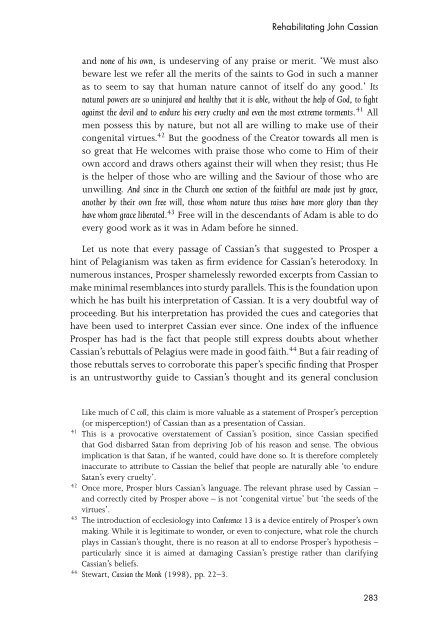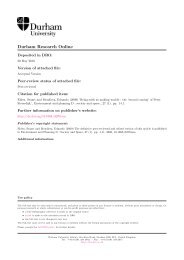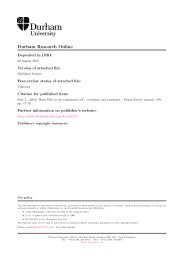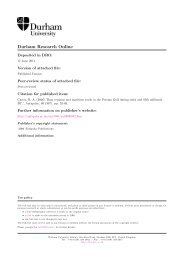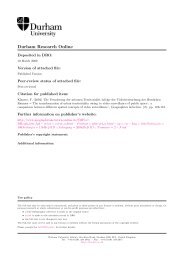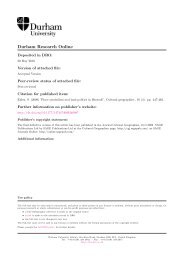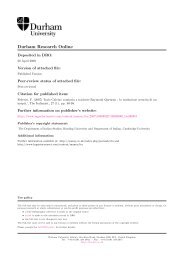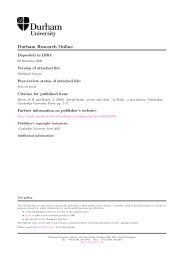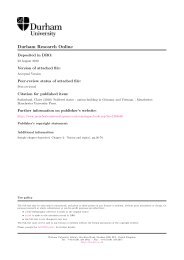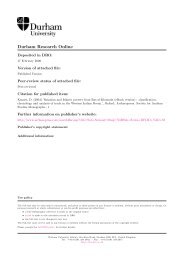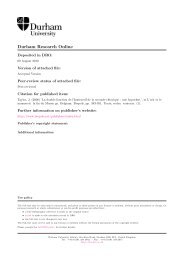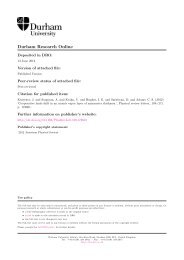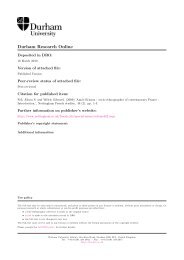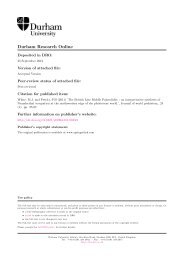Rehabilitating John Cassian: an evaluation of Prosper of Aquitaine's ...
Rehabilitating John Cassian: an evaluation of Prosper of Aquitaine's ...
Rehabilitating John Cassian: an evaluation of Prosper of Aquitaine's ...
Create successful ePaper yourself
Turn your PDF publications into a flip-book with our unique Google optimized e-Paper software.
<strong>Rehabilitating</strong> <strong>John</strong> <strong>Cassi<strong>an</strong></strong><br />
<strong>an</strong>d none <strong>of</strong> his own, is undeserving <strong>of</strong> <strong>an</strong>y praise or merit. ‘We must also<br />
beware lest we refer all the merits <strong>of</strong> the saints to God in such a m<strong>an</strong>ner<br />
as to seem to say that hum<strong>an</strong> nature c<strong>an</strong>not <strong>of</strong> itself do <strong>an</strong>y good.’ Its<br />
natural powers are so uninjured <strong>an</strong>d healthy that it is able, without the help <strong>of</strong> God, to fight<br />
against the devil <strong>an</strong>d to endure his every cruelty <strong>an</strong>d even the most extreme torments. 41 All<br />
men possess this by nature, but not all are willing to make use <strong>of</strong> their<br />
congenital virtues. 42 But the goodness <strong>of</strong> the Creator towards all men is<br />
so great that He welcomes with praise those who come to Him <strong>of</strong> their<br />
own accord <strong>an</strong>d draws others against their will when they resist; thus He<br />
is the helper <strong>of</strong> those who are willing <strong>an</strong>d the Saviour <strong>of</strong> those who are<br />
unwilling. And since in the Church one section <strong>of</strong> the faithful are made just by grace,<br />
<strong>an</strong>other by their own free will, those whom nature thus raises have more glory th<strong>an</strong> they<br />
have whom grace liberated. 43 Free will in the descend<strong>an</strong>ts <strong>of</strong> Adam is able to do<br />
every good work as it was in Adam before he sinned.<br />
Let us note that every passage <strong>of</strong> <strong>Cassi<strong>an</strong></strong>’s that suggested to <strong>Prosper</strong> a<br />
hint <strong>of</strong> Pelagi<strong>an</strong>ism was taken as firm evidence for <strong>Cassi<strong>an</strong></strong>’s heterodoxy. In<br />
numerous inst<strong>an</strong>ces, <strong>Prosper</strong> shamelessly reworded excerpts from <strong>Cassi<strong>an</strong></strong> to<br />
make minimal resembl<strong>an</strong>ces into sturdy parallels. This is the foundation upon<br />
which he has built his interpretation <strong>of</strong> <strong>Cassi<strong>an</strong></strong>. It is a very doubtful way <strong>of</strong><br />
proceeding. But his interpretation has provided the cues <strong>an</strong>d categories that<br />
have been used to interpret <strong>Cassi<strong>an</strong></strong> ever since. One index <strong>of</strong> the influence<br />
<strong>Prosper</strong> has had is the fact that people still express doubts about whether<br />
<strong>Cassi<strong>an</strong></strong>’s rebuttals <strong>of</strong> Pelagius were made in good faith. 44 But a fair reading <strong>of</strong><br />
those rebuttals serves to corroborate this paper’s specific finding that <strong>Prosper</strong><br />
is <strong>an</strong> untrustworthy guide to <strong>Cassi<strong>an</strong></strong>’s thought <strong>an</strong>d its general conclusion<br />
Like much <strong>of</strong> Ccoll, this claim is more valuable as a statement <strong>of</strong> <strong>Prosper</strong>’s perception<br />
(or misperception!) <strong>of</strong> <strong>Cassi<strong>an</strong></strong> th<strong>an</strong> as a presentation <strong>of</strong> <strong>Cassi<strong>an</strong></strong>.<br />
41 This is a provocative overstatement <strong>of</strong> <strong>Cassi<strong>an</strong></strong>’s position, since <strong>Cassi<strong>an</strong></strong> specified<br />
that God disbarred Sat<strong>an</strong> from depriving Job <strong>of</strong> his reason <strong>an</strong>d sense. The obvious<br />
implication is that Sat<strong>an</strong>, if he w<strong>an</strong>ted, could have done so. It is therefore completely<br />
inaccurate to attribute to <strong>Cassi<strong>an</strong></strong> the belief that people are naturally able ‘to endure<br />
Sat<strong>an</strong>’s every cruelty’.<br />
42 Once more, <strong>Prosper</strong> blurs <strong>Cassi<strong>an</strong></strong>’s l<strong>an</strong>guage. The relev<strong>an</strong>t phrase used by <strong>Cassi<strong>an</strong></strong> –<br />
<strong>an</strong>d correctly cited by <strong>Prosper</strong> above – is not ‘congenital virtue’ but ‘the seeds <strong>of</strong> the<br />
virtues’.<br />
43 The introduction <strong>of</strong> ecclesiology into Conference 13 is a device entirely <strong>of</strong> <strong>Prosper</strong>’s own<br />
making. While it is legitimate to wonder, or even to conjecture, what role the church<br />
plays in <strong>Cassi<strong>an</strong></strong>’s thought, there is no reason at all to endorse <strong>Prosper</strong>’s hypothesis –<br />
particularly since it is aimed at damaging <strong>Cassi<strong>an</strong></strong>’s prestige rather th<strong>an</strong> clarifying<br />
<strong>Cassi<strong>an</strong></strong>’s beliefs.<br />
44 Stewart, <strong>Cassi<strong>an</strong></strong> the Monk (1998), pp. 22–3.<br />
283


